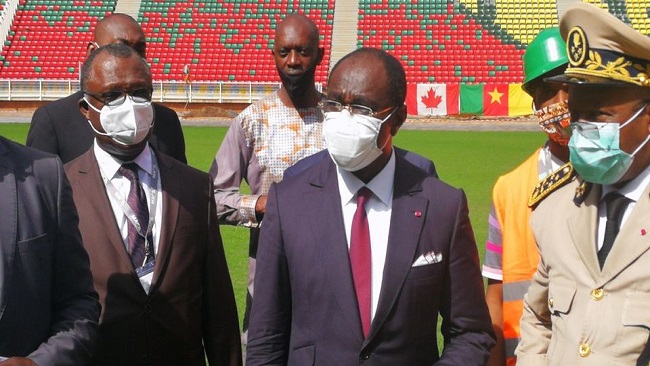AFCON Preparations: Biya has nothing to show for in Yaoundé in his close to four-decade rule
Cameroon is struggling to deliver the Paul Biya Stadium in Yaoundé which will serve host the opening and closing ceremonies of the Africa Cup of Nations (Afcon) in 2022.
Caf postponed the 32nd edition of the tournament from January 2021 to 2022, because of the disruptions occasioned by the coronavirus pandemic, giving the host country more time to complete projects. But the big question is, will the country be ready?
Cameroon’s Minister for Sports and Physical Education, Prof Narcisse Mouelle Kombi told Nation Sport he was satisfied with the progress at the Olembe Sports Complex. The 60,000-capacity stadium is expected to be named after the country’s long-serving leader, Paul Biya.
During an inspection tour of the site late July, Kombi, who is also the head of the local organising committee of the tournament, rated at 80 per cent work done so far on the stadium that was initially supposed to have been completed in December 2018.
While stripping off Cameroon the 2019 Afcon hosting rights, the continental body cited insecurity as the main reason. But the failure to meet compliance conditions including massive delays in completion of stadiums and other infrastructure, which were shrouded in controversies and corruption scandals, played a major part.
Even though the Cameroonian government had said works on the infrastructure meant for the 2019 competition would continue at same pace Yaoundé has not delivered on the promise.
The works at the Olembe facility have been progressing at a painstakingly slow pace for four years now with critics blaming the delays on the “unscrupulous manner in which the contracts of the project were awarded.”
Scores of senior government official are feared to be involved in Afcon projects-related graft that whistleblowers claim has cost the state at least $2.1 billion.
Boris Bertolt, an investigative journalist and an ardent critic of the Biya regime, leaked copies Afcon contracts between the state of Cameroon and private firms hired to execute some of the works with frighteningly huge sums of money and the government had not disputed the figures.
“The delays in completing Afcon infrastructures which have tainted the image of Cameroon are linked to blockages in the attribution of the contracts because of corruption,” Bertolt said.
The corruption scandals surrounding the Afcon projects were rife that in 2018, a radical opposition Member of Parliament, Hon Jean Michel Nintcheu called on the public to march on the streets and demand the collective resignation of the government “for massive embezzlement, aggravated corruption, organised band looting and Afcon sabotage.”
A video of a government official in the country defending why a bag of cement costs 15,000 CFA francs for the Afcon project, instead of the normal 4,500 CFA francs, caused an uproar after it went viral.
In the midst of the outrage, the government cancelled the contract for the construction of the Olembe Sports Complex from Italian firm, Piccini, and awarded it to Canadian company, MAGIL Construction, who are also struggling to complete the project.
Going by Caf ratings, the Douala-based Japoma Stadium – which was supposed to host two matches of the Caf Inter-Club Championships but were cancelled due to the coronavirus – meets the standards.
Limbe, in the English-speaking Southwest region of the country is also set, but there are fears over security issues as armed separationists continue fighting since 2016 for the independence of English speakers in the majority French speaking central African country.
In a television interview in December 2018, Caf President Ahmad Ahmad disclosed that besides enormous delays in infrastructure, Cameroon was stripped off the hosting rights of the 2019 tournament to avoid the 2010 experience where some players came under attack by Angola’s Cabinda separationists.
In the northern city of Garoua, the 20,000-seater Roumde Adjia Omnisport Stadium is said to be nearing completion, just like the accompanying training grounds. One of the hotels earmarked to host guests – a four-star facility of 70 rooms located in the Plateau neighbourhood of the city – is said to also be approaching completion.
Raymond Elume, a sports analyst in Yaoundé described the postponement of the tournament to 2022 as “a blessing in disguised” for the country that lacks vital amenities.
“I think the postponement of Afcon from January 2021 to 2022 due to Covid-19 gives Cameroon the possibility of having a tournament which we can be proud of,” Elume said. “We would have been ready to a certain degree if we were to host in January next year, but it wouldn’t have been the kind of tournament that we want Africa be proud of.”
Cameroon’s Prime Minister and Head of Government, Chief Dr Joseph Dion Ngute, recently chaired a cabinet meeting in which he recommended that ongoing works for the for the tournament be accelerated and completed in time, despite the postponement.
President Biya’s handlers believe he intends to host his peers and football leaders at the opener of the 2022 tournament at the Olembe facility bearing his name as “a sign of his determination to develop sport infrastructure in Cameroon.”
The 87-year-old has nothing to show for in Yaoundé in his close to four decades rule. The main stadium in the capital was constructed and named after his predecessor, Ahmadou Ahidjo, before the 1972 Afcon. The stadium is now standing by as a Plan ‘B’ for the 2022 Afcon opener should the proposed Paul Biya Stadium project fail to meet the standards.
Franck Mathiere, Project Manager of the Olembe Sports Complex, told journalists late last month that the coronavirus has affected ongoing construction works, “but we are confident about completing the task we have at hand.”
Culled from Nation.co.ke





